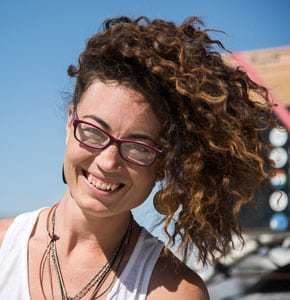Charis – California

Tell us a little bit about who you are apart from your illness. I am a writer, Episcopalian (I give great hugs), and goofball. I identify as queer. When able, I enjoy sewing, gardening, modeling, and running. I live with two super furry Maine Coon mixed cats.
What is your diagnosis and when were you diagnosed? Ankylosing Spondylitis, 2013 (symptoms since 2000)
Can you talk a little bit about your experience with diagnosis? Many people are relieved when they are finally diagnosed because now they know what to treat. My world, however, was turned upside down. My father told me shortly after my 26th birthday that my symptoms matched his and I had likely inherited his disease. From that moment onward, the visions that wound their way through my head were of my own future in his very shoes. I have to repeatedly remind myself that treatments are better now, that my quality of life is going to be better than his, and that I should not end up hunched over like a question mark like he did.
What is your greatest challenge in living with a rheumatic disease? My greatest challenge is dealing with the loss of my former self, when I could easily claim status as a former college athlete and marathoner, and when I identified as a helper and world-changer through full-time work. Now I am unable to exercise (that athlete mentality is still with me and I push myself too hard to my own detriment), I now need that same help I used to give, and I am having to refocus my efforts to change the world in different ways without being employed.
Describe something that keeps you hopeful in the day-to-day struggles with your illness. I am encouraged by the many online communities of support that exist for patients. I have also recently been feeling a sense of optimism, almost like we are reaching a tipping point for awareness about my own group of diseases, the spondyloarthropies.
As a blogger I often receive notes, comments, and messages from people who share their own experiences with me. I appreciate being trusted with these painful, vulnerable, raw stories and the hope that comes with sharing them with people who understand.
Why is advocacy important to you? Advocacy to me is empowering, but I also feel it is crucial to reaching the end point we all want most: a cure. Advocacy takes awareness-raising one step further by creating and using tools to put forth tangible goals and opportunities to alter the course of our disease states. I’m committed to doing whatever it takes to lessen the burden of rheumatic and related diseases for those who are coming after me, for as long as I live.





